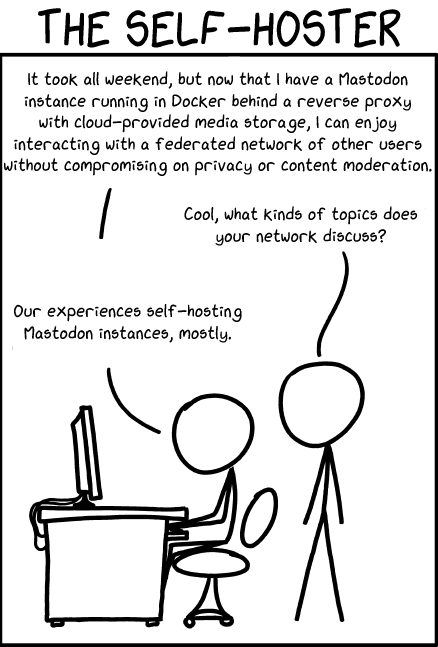Selfhosted
A place to share alternatives to popular online services that can be self-hosted without giving up privacy or locking you into a service you don't control.
Rules:
-
Be civil: we're here to support and learn from one another. Insults won't be tolerated. Flame wars are frowned upon.
-
No spam posting.
-
Posts have to be centered around self-hosting. There are other communities for discussing hardware or home computing. If it's not obvious why your post topic revolves around selfhosting, please include details to make it clear.
-
Don't duplicate the full text of your blog or github here. Just post the link for folks to click.
-
Submission headline should match the article title (don’t cherry-pick information from the title to fit your agenda).
-
No trolling.
Resources:
- selfh.st Newsletter and index of selfhosted software and apps
- awesome-selfhosted software
- awesome-sysadmin resources
- Self-Hosted Podcast from Jupiter Broadcasting
Any issues on the community? Report it using the report flag.
Questions? DM the mods!
view the rest of the comments

You want to talk about it?
Don't threaten me with a good time
It could be their own cloud. I refer to my VPSes as "the cloud" even though that's still self-hosting. My "cloud storage" would just be a 10TB storage VPS I've got.
No one else uses the term "cloud" like that.
That part of this comic really stuck out like a sore thumb. I can't tell if it's an oversight, a comment about the challenges of self-hosting, or subtle mockery of self-hosting hypocrisy.
Broadly, "the cloud" is just someone else's computer. VPSes still fall into that definition. A lot of VPS providers describe themselves as "cloud" now too (eg one of the main hosts I use, HostHatch, describes themselves that way on their site).
If a single AWS EC2 or Lightsail server (which is essentially just a VPS in one region) is considered to be "in the cloud", why not a much cheaper, more powerful server with a different provider?